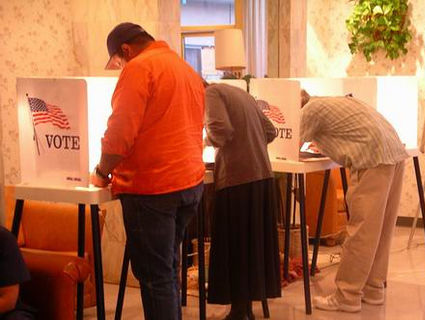
Justice Antonin ScaliaPete Marovich/ZUMAPress
Pop champagne: Racism is over.
“There is an old disease, and that disease is cured,” Bert Rein, the attorney leading the legal challenge to the Voting Rights Act—the landmark law intended to ensure all Americans can vote—told to the Supreme Court on Tuesday. “That problem is solved.”
Rein represents Shelby County, Alabama, one of the jurisdictions covered by a key section of the Voting Rights Act called Section 5. Under Section 5, parts of the country with histories of discriminatory election practices have to ask for permission—or “preclearance,” in legal terms—from the Justice Department before making any changes to their voting rules. But the South, where most of the covered jurisdictions are, has changed, Rein said, and the law, although once justified, is now unfair and unconstitutional. The five conservative justices on the Supreme Court seemed to agree. “The Marshall Plan was very good too,” argued Justice Anthony Kennedy, “but times change.”
That’s not to say all discrimination is a thing of the past. In the eyes of the high court’s conservatives, America has transcended its tragic history of disenfranchising minorities, but there’s still one kind of discrimination that matters: Discrimination against the states covered by Section 5 of the Voting Rights Act. Justice Antonin Scalia said that it was “sort of extraordinary to say” that “Congress can just pick out…these eight states,” referring to the states covered by Section 5.
Later, Scalia telegraphed his reasoning for what will almost certainly be a vote to strike down part of the law. Explaining overwhelming support for the Voting Rights Act reauthorization in Congress in 2006, Scalia called Section 5 the “perpetuation of a racial entitlement” that legislators would never have the courage to overturn. “In the House there are practically black districts by law now,” Scalia complained. (In Mississippi, a state which Roberts would later cite as a paradise of racial enlightenment, state lawmakers in the early 1990s referred to these as “nigger districts.”)
Justice Sonia Sotomayor, a liberal appointed by President Barack Obama, held her tongue until Rein rose to rebut the government’s arguments. She then lobbed Scalia’s grenade back in his direction. “Do you think the right to vote is a racial entitlement in Section 5?” she asked. “No,” Rein said, “the 15th Amendment protects the right of all to vote.” It should, but sometimes it doesn’t. That’s why Congress passed Section 5.
Scalia wasn’t the only conservative justice despondent over how unfair Section 5 is to the South. Chief Justice John Roberts, arguing that voter registration and participation of black voters is higher in Mississippi than Massachusetts, asked Solicitor General Donald B Verrilli Jr., who was defending the law, “Is it the government’s submission that the citizens of the South are more racist than the citizens of the North?”
Verrilli awkwardly cleared his throat and said no. Being from the South doesn’t mean a person is racist, and being from the North doesn’t mean a person isn’t. The notion that the South is more racist than the North might seem intuitive, though, given the hundreds of years of an economy based on the forced labor of enslaved blacks, the instigation of a bloody civil war fought over the right to own black people as property, decades of near slavery and apartheid following emancipation, and the fact that a massive effort by the federal government and several constitutional amendments were just required to ensure black Americans’ basic rights. But when Congress reauthorized the Voting Rights Act—and Section 5—in 2006, it wasn’t measuring anything so abstract as racism. It was looking at whether or not the states covered by Section 5 still sought, in less explicit ways than in the days of poll taxes and grandfather clauses, to abridge the right to vote on the basis of race.
“Of course [Section 5] was aimed at states,” said Justice Stephen Breyer, a member of the liberal bloc. “What do you think the Civil War was about?” This crowd? States rights, probably. “It’s an old disease; it’s gotten better,” Breyer said, “but it’s still there.”
Almost ignored by the justices, however, was that the Voting Rights Act has a provision that allows states to “bail out” of Section 5 coverage if they go a long time without proposing discriminatory voting changes. Almost 200 jurisdictions have bailed out of Section 5 since 1982, at a cost of about $5,000 each. Shelby County, Alabama, can’t do that, though, because in 2006 local officials redistricted the only black lawmaker in the city of Calera out of his seat.
Scalia worried that Section 5, and its unjustifiable discrimination against states, would continue in “perpetuity.” But with the bailout provision, it’s a relatively simply matter to escape the Section 5. To quote Roberts in a case striking down a school integration program, “the way to stop discrimination on the basis of race is to stop discriminating on the basis of race.”
Maybe instead of trying to gut the Voting Rights Act, Shelby County should try that.








